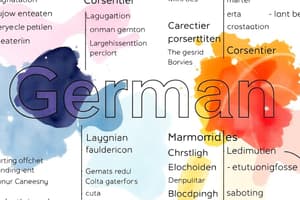Podcast
Questions and Answers
What is a key aspect of the German language?
What is a key aspect of the German language?
- It is the most widely spoken language in the world.
- It primarily originated from Latin.
- It has no unique sounds compared to other languages.
- It categorizes nouns into genders and cases. (correct)
When can the history of the German language be traced back to?
When can the history of the German language be traced back to?
- 1500 AD
- 700 AD (correct)
- 1800 AD
- 500 AD
What is a unique sound in the German language compared to English?
What is a unique sound in the German language compared to English?
- The 'sh' sound
- The 'th' sound
- The 'ch' sound
- The 'schwa' sound (correct)
Which countries have German as one of their official languages?
Which countries have German as one of their official languages?
What system categorizes German nouns into different genders and cases?
What system categorizes German nouns into different genders and cases?
What is influenced the German language during the Early Middle Ages?
What is influenced the German language during the Early Middle Ages?
Flashcards are hidden until you start studying
Study Notes
German Language
The German language is a West Germanic language originating from Old High German and spoken by around 98 million people worldwide. It's the third most widely spoken Germanic language after English and Dutch and is one of the official languages of Germany, Austria, Switzerland, Belgium, Luxembourg, Romania, Denmark, Slovakia, Hungary, and Italy. Here are some key aspects of the German language:
Origin
The history of the German language can be traced back to the Early Middle Ages, around 700 AD, when it was influenced by Latin through contact with the Romans, who ruled much of Western Europe during this period. The earliest known written records in what would become Early New High German date from around 1300 AD.
Grammar
If you're learning German grammar, there are several important concepts to understand. One of these is the system of declensions, which categorizes nouns into different genders (masculine, feminine, neuter) and cases (nominative, genitive, dative, accusative). Verbs also have distinct forms depending on tense, mood, and aspect.
Sounds
In terms of pronunciation, German has several unique sounds compared to English. One such sound is the 'schwa', which is pronounced like the 'e' in 'mend', although it doesn't appear in all positions within a word. Another difference lies in how vowels interact with each other, resulting in various diphthongs.
Vocabulary
Compared to English, German has more similarities with other European languages due to historical influences. However, there are still many words in German with cognates in English, particularly those related to biology and nature. For example, words like "Baum" (tree), "Blume" (flower), and "Pfad" (path) share common etymological roots with their English counterparts.
Learning Resources
There are numerous online resources available for learning German, ranging from apps to websites offering lessons and quizzes. These platforms often cater to different skill levels, ensuring that whether you're just starting out or looking to build upon existing knowledge, you'll find something suitable.
Studying That Suits You
Use AI to generate personalized quizzes and flashcards to suit your learning preferences.



